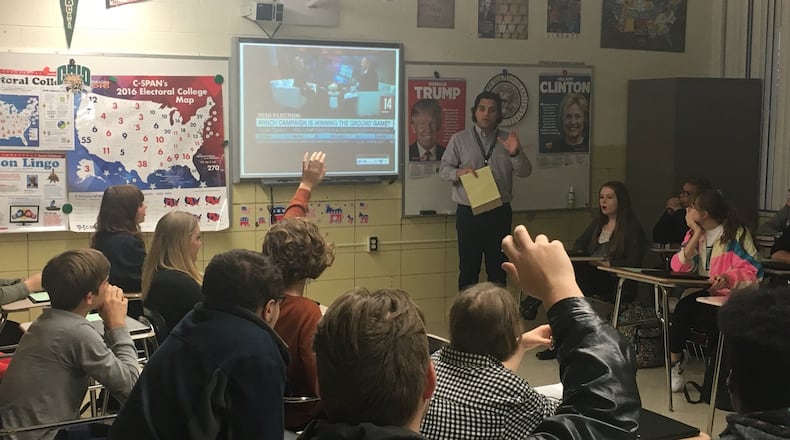Credit: DaytonDailyNews
The National Education Association, the largest U.S. teachers union and an endorser of Clinton, said Trump’s “rhetoric is affecting their ability to teach this election to school-aged children.” Seth Unger, Trump’s Ohio spokesman, said the NEA “bought and paid for” Clinton’s support, and argued Trump will make life better for teachers by increasing local control.
Meanwhile, two local high school government teachers say they address the election every day, not shying away from tough issues. Fairmont High School teacher Scott Byer said it’s a matter of developing rapport with students to know how to approach topics.
“I’m mindful that these are high school sophomores,” Byer said. “But I think my job is to educate and inform. We’re in a school setting, but every issue that has been discussed on the news, in some shape or form, we’ve discussed that.
“It’s very relevant to the study of political science and social studies.”
Angela Ruffolo, who teaches at Chaminade Julienne, said her classes are holding debates with students taking the roles of candidates. They’re also taking political surveys to analyze their own political views, comparing candidates’ positions to Catholic social teachings and more.
“Even with the crude topics and extremely unacceptable and hateful insults that have been exchanged, the biggest ideas I try to emphasize with my students are to respect each other, to find out where they personally stand politically, to do research to become informed citizens, and not to accept or believe all the rhetoric on TV or social media,” Ruffolo said.
Classroom approach
Both teachers mentioned the goal of creating critical thinkers who know how to find reputable sources of information and discern the truth. Byer’s Advanced Placement government class started Wednesday morning by watching a few minutes of CNN, Fox News and MSNBC coverage, with Byer moderating discussion on topics and each network’s presentation.
After Rudy Giuliani and Chris Cuomo shouted over each other on CNN, the students had a thoughtful discussion on gender in politics — whether Clinton would earn support from female voters simply because of her identity, or because of her grasp of women’s issues, or whether a candidate’s gender should even matter.
Byer linked ongoing campaign news to lessons he wanted to address anyway — grassroots campaigning, and how voter enthusiasm affects turnout at the polls.
“I think issues have always been polarizing, but what makes this year unique is that we have candidates who are also very polarizing in Clinton and Trump,” Byer said.
‘Uncivil’ election
Ruffolo has a “Civilize It” magnet hanging in her class. She called the mudslinging in this campaign “shocking” and “off the charts,” saying some of the things that have been said “have caused us to sink to a new low in American politics.”
The Zogby Survey on civility in U.S. politics, commissioned by Allegheny College, ranked this year’s presidential campaign the most uncivil in recent American history. Nearly two-thirds of those polled called the election “extremely or very uncivil,” compared with 20 percent in 2012.
Clinton was criticized for calling half of Trump supporters “a basket of deplorables,” but Trump has gone further, with an Access Hollywood tape revealing his crude comments about his interactions with women. His Twitter insults from the past year filled two full pages of Monday’s New York Times.
About 59 percent of those surveyed found Trump “extremely or very uncivil,” compared with 32 percent for Clinton.
The pollsters found that incivility is bleeding into everyday encounters — more say it’s OK to shout over someone during an argument, belittle or insult someone or question their patriotism because they hold a different opinion.
Student focus
Ruffolo said she keeps tying academic lessons to real-world situations, as classes study the function of the executive branch, political parties, voting and the foundations of the Constitution. Students are buying in, as her 18-year-olds have registered to vote, and almost 30 CJ students will be poll workers. Both Fairmont and CJ will host school-wide mock elections.
Byer said for all of the differences in this year’s election, there are plenty of links to the past to share with students. Candidates are arguing over the reach of the federal government, just as the founders did 230 years ago. And some Republicans are torn on whether to support the party’s candidate, as they were with Barry Goldwater in 1964.
Many students are thinking deeply about the election, and supporters of rival candidates have even had tense exchanges in the hallway at Fairmont.
“Students need to learn to think critically — they’re entitled to their own opinions, but not their own facts,” Byer said. “It’s my job as the educator to challenge those opinions, moderate the discussion, to make sure that everyone has a voice.
“In the same way that every vote counts, every voice matters in my class.”


